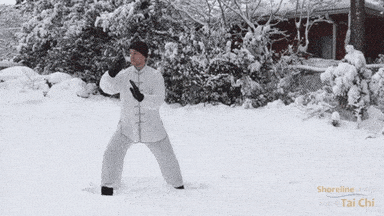- Notes from Inner Village Health
- Posts
- Movement really matters
Movement really matters

Last week, I touched on sleep as a pillar of foundational health, and the discussion continues this week with a spotlight on movement.
Chinese medicine centers on the concept of the free flow of qi. Qi, in reductive, translational terms, is the universal life force energy that flows through all things. We need qi to move smoothly in the body, through the channels, in our minds.
Physical movement is essential.

Gif by shorelinetaichi on Giphy
The relationship between qi and blood
Chinese medicine teaches us that qi and blood are in an inseparable relationship. The blood brings nourishment to the qi, and the qi moves the blood. Without healthy, replete blood, the qi becomes deficient. Without freely flowing qi, the blood cannot move and becomes stagnant.
Blood stagnation leads to pain. Have you noticed in times when you have achy muscles, a gentle walk provides so much relief? The muscles ache as blood has stagnated, and walking gets the qi moving again, which in turn moves the blood and resolves the pain. Menstrual cramps are also often the result of stagnant blood. Warmth helps the qi to move. Heating pads and hot water bottles can restore the free flow of qi, allowing the blood to move, in turn resolving cramps.
Note: Chinese medicine very strongly teaches us about the dangers and harm of cold. The introduction of cold can hinder, constrain, and injure blood and qi. This includes ice baths and cold plunges.
Blood stagnation also affects how we feel emotionally. In Chinese medicine, emotions are stored in the blood. When the blood is not moving freely, emotions may not be either (and vice versa). We can probably all think of times when we felt emotionally stagnant or constrained. We may have been tense and pent-up or maybe not even aware of our feelings because they had become repressed and pushed down. Movement often releases these feelings. People talk about the stress-relieving capacity of exercise. Chinese medicine helps us understand these effects by way of the blood.
A daily movement practice
There are all kinds of exercises and physical movement modalities you already know about. The most important point is that you choose something you can and will do with consistency.
Chinese medicine guides us toward whole-body movement that prioritizes strength and flexibility while steering us away from very intense regular workouts, like daily HIIT routines or sprinting. Instead, we want to consider forms of movement where we are expending and recouping energy, without depleting our resources.
Walking | Simple going for walks moves the qi and blood. It is ok to move at a slower pace. Try to swing your arms naturally. Try to find time for at least 20-30 minutes daily. (If it is cold where you live, always wear a scarf, as cold can enter points on the back of the neck, leading to cold invasion and potential subsequent illness.)
Qi gong | Qi gong is a type of gentle, flowing movement that traces back along the same historical lineages as Chinese herbal medicine, acupuncture, dietary practice, and bodywork. Some people think about qi gong and Chinese medicine in a relationship similar to the way yoga fits together with Ayurvedic medicine. Interestingly, qi gong means “energy work”. I like to recommend Mimi Kuo Deemer’s online resources for those hoping to get started.
Strength training | Moderate weight lifting, resistance training, or bodyweight training can strengthen muscles and bones. This form of movement can offer an appropriate intensity level without the depletion of our resources as long as proper recovery time is also planned between sessions.
It is good to challenge and move our bodies, but every yang aspect of life needs an equal yin counterpart. When planning your regular movement practice, go ahead and plan your rest and recovery time into your schedule as well. More “working out” will not be of much long-term help if there is a chronic sleep deficit; burning the candle at both ends is not a sustainable plan.
Reach out if you’re having a hard time with movement or are curious about Chinese medicine perspectives, and remember to check out the upcoming events below!
Warmest,
Artemisia

Artemisia Obi, MA
Chinese Medicine Practitioner | Clinical Herbalist
Upcoming Events
Pulse & Tongue Readings
individual mini-sessions at Fly By Provisions in Albuquerque, NM
Saturday, February 22nd | 1-3pm MST | $20
Chinese Medicine Support for Menstrual Cycles
class at Lost Cultures Tea Bar in Albuquerque, NM
Saturday, March 8th | 2-3pm MST | $30, herbal teas included
Tongue Reading & Mini-Assessments Online
individual mini-sessions online - available to everyone remotely
Wednesday evenings | 5-7pm MST | $20
Reply